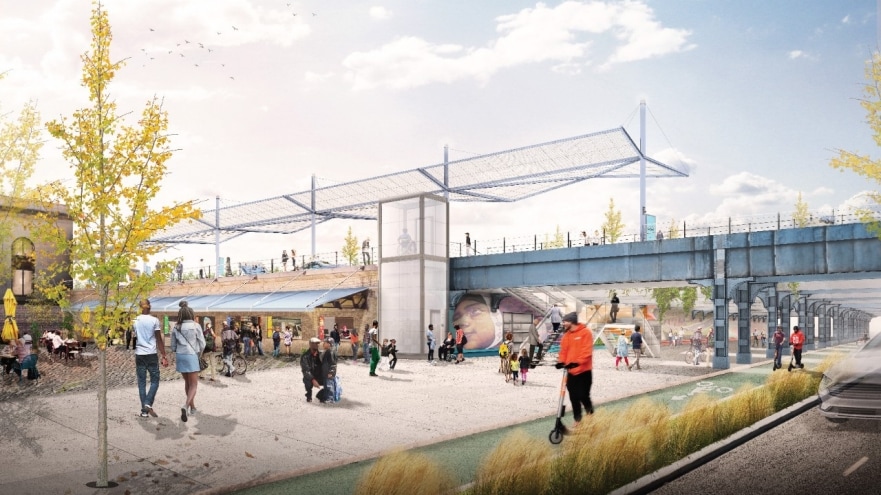The Accessible Streets Studio Announces First Cohort of Entrepreneurs
May 20, 2021
The Studio is a collaboration between Ford’s Michigan Central and Newlab to develop transformative technologies to make the City of Detroit more navigable for its residents.
Detroit, Michigan (May 20, 2021) — Michigan Central, Ford Motor Company’s new mobility innovation district in Corktown, and Newlab, a community of experts and innovators applying transformative technology to solve the world’s biggest challenges, today announced that seven companies from a competitive pool of global applicants have been selected as members of the inaugural cohort of the Accessible Streets Studio.
Launched by Michigan Central and Newlab in 2020, the Accessible Streets Studio brings together Detroiters, civic stakeholders, startups, and industry experts to co-design high-impact, innovative mobility solutions to address community needs in a meaningful and impactful manner. Working with the City and applicable agencies, in the summer and fall of this year, the Accessible Streets Studio companies plan to deploy their technologies and services across Detroit neighborhoods to help address residents’ mobility challenges.
In January 2021, the Studio announced an open call for companies developing frontier technologies and novel products to apply to participate in the first cohort, which will tackle four major challenges faced by Detroit residents. The four themes, which were uncovered through engagement with Detroit residents, community organizers, policymakers, and researchers, are: bridging transportation gaps, improving access to essential resources, fostering safe and welcoming streets, and ensuring access to timely and relevant mobility information.
The seven inaugural companies in the Accessible Streets Studio 2021 include:
- Soofa builds the first of its kind, solar-powered digital signs with e-ink display. Soofa Signs feature real-time updates on mobility resources, city communication and wayfinding.
- Kiwibot builds the autonomous delivery infrastructure of tomorrow for campuses, communities and cities. With local deliveries powered by robots, Kiwibot is focused on providing an affordable, reliable, and friendly service.
- Solartonic delivers solar power and wireless networks to smart communities exactly where they need it, managed through a remote cloud-based platform – solahub™- that integrates lighting, CCTV, IoT sensors, signage, and Wi-Fi network systems for mobility management and safe streets.
- Numina measures all kinds of curb-level activity to support urban planning, policy, and operations that account for everyone, not just cars. Committed to Privacy by Design, Numina delivers completely anonymous and aggregated volume counts, paths, and traffic behaviors of travelers and objects in streets.
- Lazarillo provides a navigation app for people who are blind and visually impaired to navigate the city using audible assistance that expertly guides them through their physical environment and also connects them to services while at home.
- KUHMUTE is the universal charging network for anything smaller than a car, agnostic to both shared fleets and personally-owned micro-mobility vehicles. Proudly designed and made in Flint, MI.
- Sway Mobility offers carshare-as-a-service by creating tailored, turnkey electric vehicle carshare programs for communities that include vehicles, insurance, tech, charging infrastructure and operational support.
“By solving local mobility challenges, we can help connect our communities and build more equitable cities,” said Julie Roscini, who leads the Michigan Central development’s external engagement strategy for Ford. “The Accessible Streets Studio is laser focused on identifying innovative solutions to help improve urban life for everyone, and it’s fitting that this first cohort is prioritizing the diverse neighborhoods around Michigan Central. We look forward to co-creating the future of mobility with the Detroit community and our innovation partners.”
In addition to two local companies from Michigan, the cohort represents teams from California, Ohio, Massachusetts, Florida, and New York looking to partner with Detroit. As teams plan pilot projects in Detroit neighborhoods they will be joining the growing mobility innovation ecosystem of Detroit working to shape the future of transportation in a way that benefits everyone. Over the coming months, each company will work closely with Newlab, Michigan Central, Studio advisors, and the community to design and develop plans for the deployment of their technologies and services in local communities.
Additionally, projects+PEOPLE, a Detroit-based organization dedicated to advancing economic mobility, will lead community engagement for the Studio. Its focus will be on strategically supporting the cohort’s pilot planning and rollout, and facilitating engagement with the local community. The team will work with individuals and organizations from different Detroit neighborhoods to raise awareness of the pilot projects and establish touch points between the local community and the companies deploying new products and services to cultivate opportunities for feedback.
Pilots will prioritize four neighborhoods near Michigan Central Station: Corktown, North Corktown, Hubbard Richard and Mexicantown. Through feedback and guidance from the Studio advisors, as well as through engagements led by project+PEOPLE for residents to interact with the companies, ask questions and offer suggestions, company teams will gain critical insights for how to best adapt their solutions to meet Detroit’s needs and build momentum for adoption and long-term traction.
“We are excited to welcome the Accessible Streets Studio’s first member cohort–an incredible slate of companies at the forefront of mobility, urban technology, and sustainability,” said Shaina Horowitz, VP of Product and Programs at Newlab. “We launched the Accessible Streets Studio to drive cutting-edge innovation that will help make city life more easily navigable for the residents of Detroit by addressing critical gaps in transportation, public safety, and access to resources and information. We’re looking forward to working with the cohort companies to launch pilot projects in Detroit to generate important learnings and impact for residents, the City of Detroit and cities across the world.”
The company applications underwent a diligent review and selection process, which included feedback from representatives across Michigan Central, the Office of Future Mobility and Electrification, the Detroit Department of Transportation, the City of Detroit, Assembly Ventures, Silicon Foundry, Wayne State University, University of Michigan, and the Boys and Girls Club of Southeastern Michigan.
If you’re interested in getting involved with the Studio or the pilots, contact the Studio team at accessiblestreets@newlab.com.


